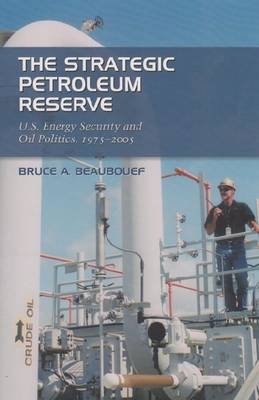
The Strategic Petroleum Reserve
U.S. Energy Security and Oil Politics, 1975-2005
Seiten
2007
Texas A & M University Press (Verlag)
978-1-58544-600-1 (ISBN)
Texas A & M University Press (Verlag)
978-1-58544-600-1 (ISBN)
The US Strategic Petroleum Reserve (SPR) has become the nation's primary tool of energy policy. This book examines the interactions that have shaped the development of the SPR. It argues that the SPR has survived because it is a passive regulatory tool that serves to protect energy consumers and petroleum consumption.
In 1973, the United States and other western countries were shocked by the Arab oil embargo. Lines formed at gasoline pumps; fuel stations ran out of supply; prices skyrocketed; and the nation realized its vulnerability to decisions made by leaders of countries half a world away. In response, the U.S. Strategic Petroleum Reserve (SPR), which was signed into law by President Gerald Ford in 1975, has become the nation's primary tool of energy policy. Following its first major use during the Persian Gulf War of 1991, officials and policy makers at the highest levels increasingly turned to the SPR to stave off shortages and mitigate rising energy prices. Author and historian Bruce A. Beaubouef examines, for the first time, the interactions that have shaped the development of the SPR. He argues that the SPR has survived because it is a passive regulatory tool that serves to protect energy consumers and petroleum consumption and does not compete with the American oil industry. Indeed, by the late twentieth century, as American import dependency reached new heights, refiners and transporters increasingly relied upon the SPR as a ready resource to help maintain feedstock when supplies were tight or disrupted. In a time of continued vulnerability, this definitive work will be of interest to those concerned with the history, economy, and politics of the oil and gas industry, as well as to historians and practitioners of oil and energy policy.
In 1973, the United States and other western countries were shocked by the Arab oil embargo. Lines formed at gasoline pumps; fuel stations ran out of supply; prices skyrocketed; and the nation realized its vulnerability to decisions made by leaders of countries half a world away. In response, the U.S. Strategic Petroleum Reserve (SPR), which was signed into law by President Gerald Ford in 1975, has become the nation's primary tool of energy policy. Following its first major use during the Persian Gulf War of 1991, officials and policy makers at the highest levels increasingly turned to the SPR to stave off shortages and mitigate rising energy prices. Author and historian Bruce A. Beaubouef examines, for the first time, the interactions that have shaped the development of the SPR. He argues that the SPR has survived because it is a passive regulatory tool that serves to protect energy consumers and petroleum consumption and does not compete with the American oil industry. Indeed, by the late twentieth century, as American import dependency reached new heights, refiners and transporters increasingly relied upon the SPR as a ready resource to help maintain feedstock when supplies were tight or disrupted. In a time of continued vulnerability, this definitive work will be of interest to those concerned with the history, economy, and politics of the oil and gas industry, as well as to historians and practitioners of oil and energy policy.
BRUCE A. BEAUBOUEF is the managing editor of Hart Publications in Houston. Holder of a Ph.D. in history from the University of Houston, he has worked since 1995 as an editor for oil and gas magazines and journals.
| Erscheint lt. Verlag | 30.10.2007 |
|---|---|
| Reihe/Serie | Kenneth E. Montague Series in Oil and Business History |
| Zusatzinfo | 12 b&w photos, 22 graphs, 4 tables, bibliography, index |
| Verlagsort | College Station |
| Sprache | englisch |
| Gewicht | 763 g |
| Themenwelt | Geschichte ► Allgemeine Geschichte ► Zeitgeschichte |
| Geisteswissenschaften ► Geschichte ► Regional- / Ländergeschichte | |
| Sozialwissenschaften ► Politik / Verwaltung | |
| Technik ► Elektrotechnik / Energietechnik | |
| ISBN-10 | 1-58544-600-9 / 1585446009 |
| ISBN-13 | 978-1-58544-600-1 / 9781585446001 |
| Zustand | Neuware |
| Haben Sie eine Frage zum Produkt? |
Mehr entdecken
aus dem Bereich
aus dem Bereich
Gewalt, Umwelt, Identität, Methode
Buch | Softcover (2024)
Spector Books OHG (Verlag)
CHF 49,95


